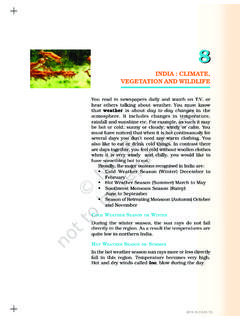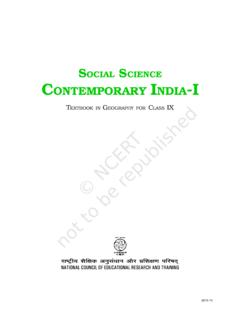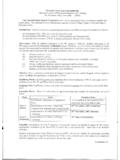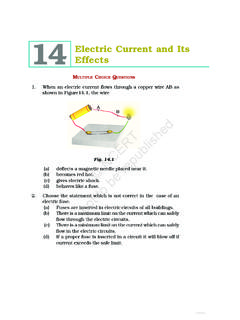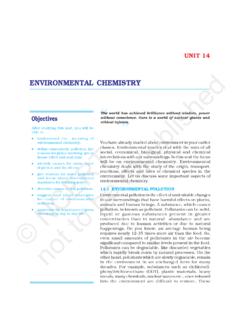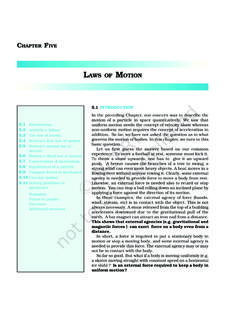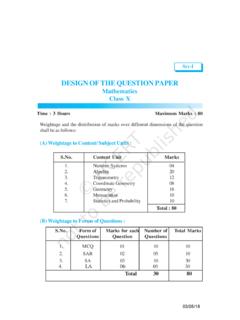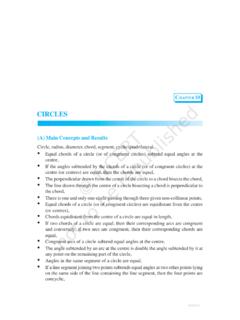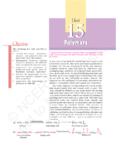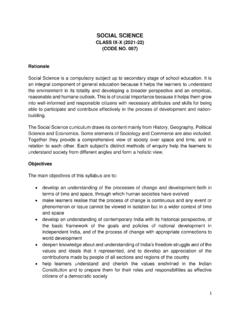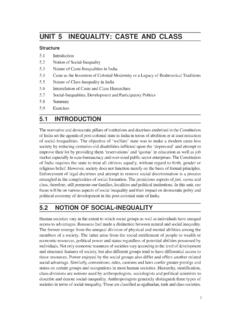Transcription of GEOGRAPHY AS A DISCIPLINE - NCERT
1 GEOGRAPHY AS A DISCIPLINEThis unit deals with GEOGRAPHY as an integrating DISCIPLINE ; as a science of spatialattributes Branches of GEOGRAPHY ; importance of physical geographyUNITI2021-22 You have studied GEOGRAPHY as one of thecomponents of your Social Science courseupto the secondary stage. You arealready aware of some of the phenomena ofgeographical nature in the world and itsdifferent parts. Now, you will study GEOGRAPHY as an independent subject and learn about thephysical environment of the earth, humanactivities and their interactive , a pertinent question you can ask atthis stage is Why should we studygeography? We live on the surface of the lives are affected by our surroundings inmany ways. We depend on the resources tosustain ourselves in the surrounding societies subsisted on natural meansof subsistence , edible plants and the passage of time, we developedtechnologies and started producing our foodusing natural resources such as land, soil andwater.
2 We adjusted our food habits andclothing according to the prevailing weatherconditions. There are variations in the naturalresource base, technological development,adaptation with and modification of physicalenvironment, social organisations and culturaldevelopment. As a student of GEOGRAPHY , youshould be curious to know about all thephenomena which vary over space. You learnabout the diverse lands and people. Youshould also be interested in understanding thechanges which have taken place over equips you to appreciate diversityand investigate into the causes responsible forcreating such variations over time and will develop skills to understand the globeconverted into maps and have a visual senseof the earth s surface. The understanding andthe skills obtained in modern scientifictechniques such as GIS and computercartography equip you to meaningfullycontribute to the national endeavour the next question which you may liketo ask is What is GEOGRAPHY ?
3 You know thatearth is our home. It is also the home of manyother creatures, big and small, which live onthe earth and sustain. The earth s surface isnot uniform. It has variations in its physicalfeatures. There are mountains, hills, valleys,plains, plateaus, oceans, lakes, deserts andwilderness. There are variations in its socialand cultural features too. There are villages,cities, roads, railways, ports, markets andmany other elements created by human beingsacross the entire period of their variation provides a clue to theunderstanding of the relationship between thephysical environment and social/culturalfeatures. The physical environment hasprovided the stage, on which human societiesenacted the drama of their creative skills withthe tools and techniques which they inventedand evolved in the process of their culturaldevelopment. Now, you should be able toattempt the answer of the question posedearlier as to What is GEOGRAPHY ?
4 In verysimple words, it can be said that geographyis the description of the earth. The termgeography was first coined by Eratosthenese,a Greek scholar (276-194 BC.). The word hasbeen derived from two roots from Greeklanguage geo (earth) and graphos (description). GEOGRAPHY AS A DISCIPLINECHAPTER2021-22 GEOGRAPHY AS A DISCIPLINE3 Put together, they mean description of the earth has always been seen as the abodeof human beings and thus, scholars definedgeography as, the description of the earth asthe abode of human beings . You are aware ofthe fact that reality is always multifaceted andthe earth is also multi-dimensional, that iswhy many disciplines from natural sciencessuch as geology, pedology, oceanography,botany, zoology and meteorology and anumber of sister disciplines in social sciencessuch as economics, history, sociology, politicalscience, anthropology, etc.
5 Study differentaspects of the earth s surface. GEOGRAPHY isdifferent from other sciences in its subjectmatter and methodology but at the same time,it is closely related to other derives its data base from all thenatural and social sciences and attempts have noted that there exist variationsover the surface of the earth in its physical aswell as cultural environment. A number ofphenomena are similar and many are was, therefore, logical to perceive geographyas the study of areal differentiation. Thus, GEOGRAPHY was perceived to study all thosephenomena which vary over do not study only the variationsin the phenomena over the earth s surface(space) but also study the associations withthe other factors which cause these example, cropping patterns differ fromregion to region but this variation in croppingpattern, as a phenomenon, is related tovariations in soils, climates, demands in themarket, capacity of the farmer to invest andtechnological inputs available to , the concern of GEOGRAPHY is to find outthe causal relationship between any twophenomena or between more than geographer explains the phenomena ina frame of cause and effect relationship, as itdoes not only help in interpretation but alsoforesees the phenomena in geographical phenomena, both thephysical and human, are not static but highlydynamic.
6 They change over time as a result ofthe interactive processes between everchanging earth and untiring and ever-activehuman beings. Primitive human societies weredirectly dependent on their immediateenvironment. GEOGRAPHY , thus, is concernedwith the study of Nature and Humaninteractions as an integrated whole. Human is an integral part of nature and nature hasthe imprints of human . Nature has influenceddifferent aspects of human life . Its imprints canbe noticed on food, clothing, shelter andoccupation. Human beings have come to termswith nature through adaptation andmodification. As you already know, the presentsociety has passed the stage of primitivesocieties, which were directly dependent ontheir immediate physical environment forsustenance. Present societies have modifiedtheir natural environment by inventing andusing technology and thus, have expanded thehorizon of their operation by appropriating andutilising the resources provided by nature.
7 Withthe gradual development of technology, humanbeings were able to loosen the shackles of theirphysical environment. Technology helped inreducing the harshness of labour, increasedlabour efficiency and provided leisure tohuman beings to attend to the higher needs oflife. It also increased the scale of productionand the mobility of interaction between the physicalenvironment and human beings has been verysuccinctly described by a poet in the followingdialogue between human and nature (God).You created the soil, I created the cup, youcreated night, I created the lamp. You createdwilderness, hilly terrains and deserts; Icreated flower beds and gardens. Humanbeings have claimed their contribution usingnatural resources. With the help of technology,human beings moved from the stage ofnecessity to a stage of freedom. They have puttheir imprints everywhere and created newpossibilities in collaboration with nature.
8 Thus,we now find humanised nature andnaturalised human beings and geographystudies this interactive relationship. The spacegot organised with the help of the means oftransportation and communication links (routes) and nodes (settlements of alltypes and hierarchies) integrated the space and2021-22 FUNDAMENTALS OF PHYSICAL GEOGRAPHY4gradually, it got organised. As a social sciencediscipline, GEOGRAPHY studies the spatialorganisation and spatial integration . GEOGRAPHY as a DISCIPLINE is concerned withthree sets of questions:(i)Some questions are related to theidentification of the patterns of naturaland cultural features as found over thesurface of the earth. These are thequestions about what?(ii)Some questions are related to thedistribution of the natural and human/cultural features over the surface of theearth. These are the questions aboutwhere?Taken together, both these questions takecare of distributional and locational aspects ofthe natural and cultural features.
9 Thesequestions provided inventorised information ofwhat features and where located. It was a verypopular approach during the colonial two questions did not make geographya scientific DISCIPLINE till the third question wasadded.(iii)The third question is related to theexplanation or the causal relationshipsbetween features and the processes andphenomena. This aspect of geographyis related to the question, why? GEOGRAPHY as a DISCIPLINE is related tospace and takes note of spatial characteristicsand attributes. It studies the patterns ofdistribution, location and concentration ofphenomena over space and interprets themproviding explanations for these patterns. Ittakes note of the associations and inter-relationships between the phenomena overspace and interprets them providingexplanations for these patterns. It also takesnote of the associations and inter-relationshipsbetween the phenomena resulting from thedynamic interaction between human beingsand their physical AS AN INTEGRATING DISCIPLINEG eography is a DISCIPLINE of synthesis.
10 Itattempts spatial synthesis, and historyattempts temporal synthesis. Its approach isholistic in nature. It recognises the fact thatthe world is a system of present world is being perceived as a globalvillage. The distances have been reduced bybetter means of transportation increasingaccessibility. The audio-visual media andinformation technology have enriched the database. Technology has provided better chancesof monitoring natural phenomena as well asthe economic and social as an integrating DISCIPLINE hasinterface with numerous natural and socialsciences. All the sciences, whether natural orsocial, have one basic objective, ofunderstanding the reality. Geographyattempts to comprehend the associations ofphenomena as related in sections of shows the relationship of geographywith other sciences. Every DISCIPLINE , concernedwith scientific knowledge is linked withgeography as many of their elements vary overspace.
